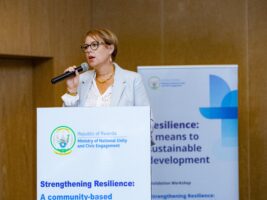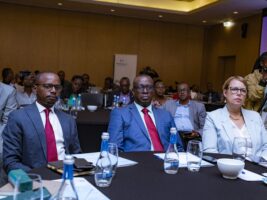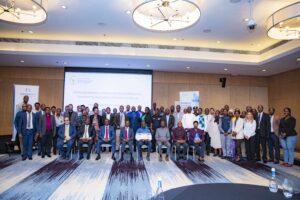The Ministry of National Unity and Civic Engagement (MINUBUMWE), in collaboration with Interpeace has released new research titled: a Community-based Participatory Framework for the Assessment of Resilience in Rwanda. These findings were presented, along with insightful recommendations, during a stakeholder engagement event held on 8 March 2024 in Kigali, Rwanda.
The objective of this study, conducted across all 30 districts of Rwanda, was fourfold. Firstly, it aimed to formulate and validate resilience indicators for structuring future research activities, policies, and programmes related to community resilience in Rwanda. Secondly, it sought to devise a participatory, multi-level methodology for assessing resilience indicators, drawing from existing frameworks, while tailoring them to Rwanda's specific context. Additionally, the study aimed to establish a baseline for community resilience across all districts of Rwanda and to propose actionable policy and programmatic recommendations for enhancing resilience nationwide. Involving a significant sample of 7,481 individuals, the study adopted a mixed-methods approach, integrating both qualitative and quantitative methods. Resilience was evaluated across four levels—individual, household, community, and institutional—using a comprehensive set of 38 indicators.
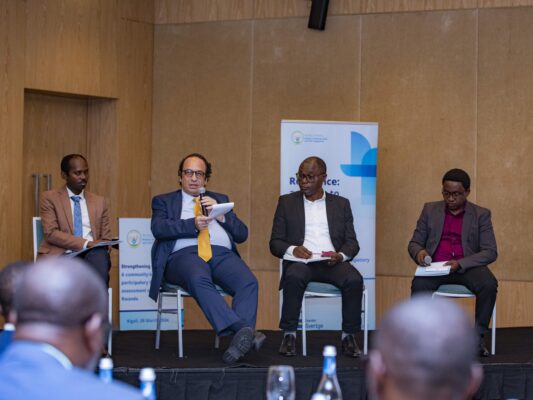
The findings underscored a commendable degree of resilience across all assessed levels, demonstrating a significant milestone three decades after the Genocide against the Tutsi. Recommendations emphasised the need for intensified efforts in societal healing initiatives, infrastructure development, and facilitating access to finance and employment opportunities.
During the stakeholder engagement event, Professor Francois Masabo, a lecturer and researcher at the University of Rwanda, lauded the study. He acknowledged its holistic approach and alignment with Rwanda's contextual realities.
The study received financial support from the Government of Sweden through its embassy in Rwanda. Martina Fors Mohlin, Counselor and Head of Development Cooperation at this embassy, reiterated Sweden's commitment to supporting the implementation of the developed framework within Rwandan communities. “We are proud to have taken part in this study by supporting Interpeace and also the ministry (MINUBUMWE) and enabling this conversation to take place. I very much look forward to working together to take those conclusions forward as we implement them in the society,” she noted.
The Community-based Participatory Framework for the Assessment of Resilience stands as a landmark initiative in Rwanda. It serves as a foundational reference point for future studies in the field of resilience within the country. Honorable Dr. Jean Damascene Bizimana, Minister of National Unity and Civic Engagement, underscored the timeliness of the research, noting Government of Rwanda’ s shift through MINUBUMWE, towards enhancing and strengthening the resilience of Rwandans amidst ongoing challenges stemming from the consequences of the Genocide agains the Tutsi.
“Resilience is one of Rwandan values. We want to design programmes and initiatives that are informed by our cultural values, which will help to effectively address our specific problems. This research that MINUBUMWE conducted jointly with Interpeace responds to this need. It will enable us to strengthen the resilience of Rwandans, to build a peaceful and prosperous country based on concrete and realistic indicators,” Hon. Bizimana highlighted.
As a way forward, a comprehensive roadmap is currently in development. This roadmap will guide the implementation of findings and recommendations derived from the research study. It serves as a strategic blueprint for all stakeholders involved in societal healing and resilience efforts. Each stakeholder will be tasked with setting specific strategic and programmatic objectives, along with corresponding targets and actions. These objectives aim to sustain the gains achieved in resilience while simultaneously addressing any fragilities identified during the research study.
In Côte d'Ivoire, the socio-political environment and democratic governance remain fragile in many localities, more than a decade after the 2010 post-electoral crisis that officially claimed more than three thousand lives. The population's low level of participation in the management of public affairs, coupled with persistent tensions surrounding the appointment of certain customary or political authorities, and a feeling of abandonment and mistrust towards certain government authorities, provide fertile ground for the political manipulation of latent conflicts and tensions within communities.
This risk is particularly acute during elections. On the occasion of the local elections (municipal and regional on October 13, 2018) and the presidential election on October 31, 2020, violent confrontations within the population took place. In some localities, in addition to these tensions, accusations of pressure, manipulation of the electoral process and falsification of results were made between supporters. These cycles of political and electoral violence are further exacerbated by the lack of support for local democratic governance mechanisms, which are often weakened.
In response to these threats to peace and cohesion, Indigo Côte d'Ivoire and Interpeace, with the technical support of their partner SeeD (Centre for Sustainable Peace and Democratic Development), carried out a consultation process and a survey called SCORE, to analyze the key determinants and levers for preventing political violence in the country.
One of the key messages to emerge from this research is that "a locality's vulnerability to political violence is illustrated by a context in which communities tend to withdraw into themselves and avoid integrating with others".
Such contexts can be identified by the uneasy nature of daily interactions between social groups (political, religious, ethnic) and the easy transition from "harmless" events (e.g. a soccer match or a car accident) to inter-group conflict. This dynamic weakens the social bonds between communities, predisposing them to violent confrontation.
In response to these findings, the “Cadre de Collaboration” (CdC - Collaboration Frameworks) have been set up. This collaborative governance engineering of conflict prevention and management initiatives at local level has produced satisfactory results, such as the absence of violence observed during the municipal, senatorial and regional elections in 2023, in the areas where the project was implemented.
In Béoumi (central Côte d'Ivoire), for example, the CDC was set up in a context of great mistrust between communities. However, thanks to their actions, the first members of the collaborative framework, essentially made up of influential members of a single community, managed to integrate members of other communities into the group. They achieved this by canvassing relevant and influential actors to facilitate the participation of other communities in community-building initiatives; the latter were subsequently invited to the various workshops and dialogue sessions with the CDC, which facilitated their adhesion. Thanks to this strategy, the framework has a heterogeneous and inter-community coloration and now carries out activities in the different neighborhoods of the locality.
Similarly, the town of Divo (in the south of the country), which was notorious for inter-community clashes at every election, whether local or national, was able to win the bet of "Zero violence" at the last poll.
"In Divo, our CDC is quite young, dating back to March 2023. But before that, the town of Divo was marked by a succession of post-electoral conflicts. And these conflicts have remained etched in the collective memory. As a result, violence peaked in August 2020 (presidential election), resulting in loss of life (...). There was a certain polarization between natives and non-natives. The CDC initiated a number of actions aimed at these people, who were heavily involved in the violence of 2020. There were talk-debates with women who were also actively involved in the conflicts, and also a meeting with young people. This helped us enormously, as this year's regional and municipal elections took place peacefully. The CDC met with the political candidates and staff, and they got involved in the peace process. They resolved to talk to their militants to ensure that this year's elections take place in good conditions, and that's what's been done", says the sub-prefect of Divo.
Several of the region's administrative authorities have expressed the wish to see a Collaborative Framework set up in their constituencies. And indeed, as the 2025 presidential election approaches, there seems to be a major need to scale up and strengthen these prevention structures and mechanisms within the areas most affected during previous electoral cycles, as expressed by the stakeholders. The aim is to prevent divisions between supporters of different political leaders turning into community conflicts in the long term.
As the Ivorian Minister for National Cohesion, Solidarity and the Fight against Poverty, LOGBOH Myss Belmonde DOGO, put it at the close of the project: "As the project draws to a close, and with the 2025 elections looming, anticipation must be the watchword. We need to step up the pace so that we don't just act on the eve of the elections and reap positive results. That's why I'm inviting Interpeace, Indigo, SeeD and others to join us in building the future. (...) It's important to be able to extend this collaborative, citizen-based governance engineering beyond the localities that have already benefited, because the results show that this is an approach that can really help reduce violence and conflict in a sustainable way, and above all through the commitment and ownership of everyone", she asserted.
The head of the European Union delegation to Côte d'Ivoire, Ambassador Francesca Di Mauro, agrees: "We are all looking ahead to the upcoming elections, particularly the presidential elections, which are generating a great deal of excitement and therefore potentially present risks. This general context arouses our attention and challenges us all to consider our responsibility and our role in ensuring that the democratic game and the animation of political life are not opportunities for violence, but rather moments of dialogue to build a harmonious and peaceful society".
In line with these orientations, one of the main recommendations of this survey is the short-term implementation of a barometric tool enabling an early warning and response system based on the results of the SCORE analysis, going hand in hand with the scaling-up of collaborative frameworks throughout Côte d'Ivoire.
Access all SCORE survey results here and the summary report of analyses and recommendations here.
Mogadishu, Somalia, 2 March 2024 – The Ministry of Interior, Federal Affairs & Reconciliation (MOIFAR) of the Federal Government of Somalia and Interpeace, an international organization dedicated to peacebuilding, have signed a Memorandum of Understanding (MoU) to advance the National Reconciliation Plan. This plan aims to rebuild trust among the Somali people and in government institutions for peaceful co-existence, recovery, and reconstruction.
The MoU, signed by His Excellency Ahmed Moallim Fiqi, Minister, MOIFAR, and Itonde Kakoma, President of Interpeace, establishes a partnership focused on promoting reconciliation, sharing expertise, and supporting peacebuilding processes across Somalia. Through this collaboration, MOIFAR and Interpeace aim to work on key areas to empower local communities, civil society, and government stakeholders in their joint pursuit of sustainable peace.
In his remarks on the partnership, Minister Ahmed Moallim Fiqi stated, "We are honored to commence this vital partnership with Interpeace. Together, we will endeavor to foster an environment conducive to peace and reconciliation through the framework of the national reconciliation pillars, which are crucial for Somalia's stability."
Interpeace, known for its 30 years of community-led peacebuilding efforts, will utilise its experience and networks to aid MOIFAR's endeavors in Somalia. "This partnership represents a significant step towards a genuine commitment to advancing the National Reconciliation Plan," affirmed Itonde Kakoma, President of Interpeace.
The collaboration between MOIFAR and Interpeace marks a significant step forward in advancing peacebuilding and reconciliation efforts in Somalia. By embracing the principles of peace, dignity and participatory approaches, both parties are committed to contributing meaningfully to Somalia's journey towards sustainable peace and development.
For more information please contact:
Ahmed Abdullahi
Country Representative, Somalia Interpeace
abdullahi@interpeace.org
As part of its peacebuilding mission, Interpeace initiated, with the technical and financial support of the PATRIP Foundation, the Kreditanstalt für Wiederaufbau (KFW), Germany and Denmark, the “Brique par brick: strengthening social cohesion and preventing conflicts on the Mali-Burkina Faso border”. This initiative aims to promote the economic, political and social stabilization and resilience of communities living in fragile regions, particularly along the borders between Mali and Burkina Faso, and to promote local conflict resolution and prevention of violent extremism. To this end, Interpeace has developed a system to support the empowerment of women and young people.
The security crisis and community conflicts in the Sahel call for a synergy of actions by States, development partners and community organizations with the aim of reinstating or consolidating social cohesion and living together. Echoing the urgency inherent to this situation in the Mali-Burkina Faso border strip, Interpeace has developed, with the support of the PATRIP Foundation, the project “Brick by brick: strengthening social cohesion and preventing conflicts at the border Mali-Burkina Faso”. This initiative was preceded by a first phase which brought to the fore, in a participatory manner, the conflict dynamics of the border area as well as the responses to be addressed.
Among the proposed avenues, the development of income-generating activities with an environmental dimension stands out, the objective of which is to promote the empowerment of vulnerable populations, particularly women and young people. This approach helps to reduce the sources of social tension around the exploitation of natural resources.
In view of the community dimension of the activities and for issues linked to local ownership and the sustainability of the project, support for income-generating activities was carried out with the support of local organizations both in Mali and in Burkina Faso. Faso. These include Esther Vision from Burkina Faso and the NGO Action for the Development of Local Initiatives (ADILO) from Mali.
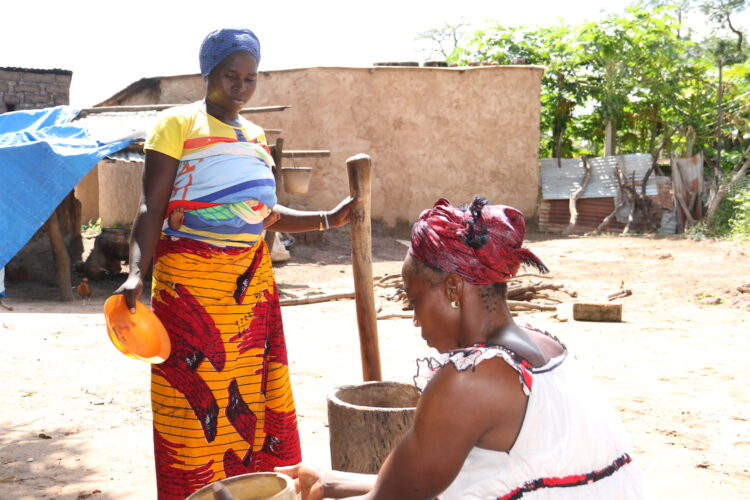
The support system for income-generating activities was developed in three stages. After a study to identify and popularize green jobs, sixty women and young people were chosen and trained in livestock breeding, cereal production, the processing of non-wood forest products and even beekeeping. The participants followed a participatory and inclusive process and according to criteria of vulnerability, age, gender and residence. At the end of the training, they were given installation and start-up kits. “I received training in beekeeping, then I was provided with production equipment. Thanks to this, I now have a profitable activity and I have acquired new knowledge about harvesting and marketing honey,” says Mamadou Traoré, a participant from Koloko, Burkina Faso.
In addition, the income-generating activities promoted launch different employment prospects with the aim of establishing alternatives to activities linked to the exploitation of natural resources which is the subject of tensions in the project intervention area. “Thanks to the training, I received skills that allow me to improve my productivity, conservation and marketing of soumbala. Today, we make more profits,” says Odette Sanou, a participant and soumbala producer from Koloko, Burkina Faso.
From comments collected from young people and women, it appears that these alternatives developed have made it possible to reduce competition around the exploitation of natural resources. Conflicts on this issue have therefore diminished. Indeed, all the participants recognized that before the project intervention, women derived most of their income from the exploitation of non-timber forest products: shea and néré among others. The resulting competition constituted a real source of daily conflicts. These often transcend families to involve entire villages.
Today, the promotion of income-generating activities has not only reduced competition around these activities, but has also allowed women to have other perspectives, considerably reducing conflicts linked to the exploitation of natural resources. Wassa Sanogo, a participant residing in Hermakono, Mali, stated that: “since I moved towards the breeding of small ruminants, I get along better with my co-wives and the other women who process and sell the shea’s nuts.
Also, difficulties in accessing land have exacerbated unemployment and precariousness among young people. This situation exposes them to the alternatives proposed by the armed groups present in the area. Support for carrying out income-generating activities is, from their point of view, likely to increase their empowerment and strengthen their resilience in the face of recruitment attempts by armed groups. Drissa Traoré, a participant residing in Hermakono, Mali, maintained that “thanks to the training, I was able to acquire farming techniques which allowed me to cultivate corn on one hectare and the harvests look good. I think that if all young people had this chance, terrorist groups would not have been able to enlist some and we would be at peace”.
Ultimately, if income-generating activities are primarily intended to support the empowerment of women and young people, they contribute to reducing competition around the exploitation of natural resources and strengthening their resilience. They therefore help prevent conflicts and strengthen social cohesion. This is why, for Interpeace and its partners, support for these activities as means of subsistence today constitute one of the alternatives for responding to these challenges in that African region.
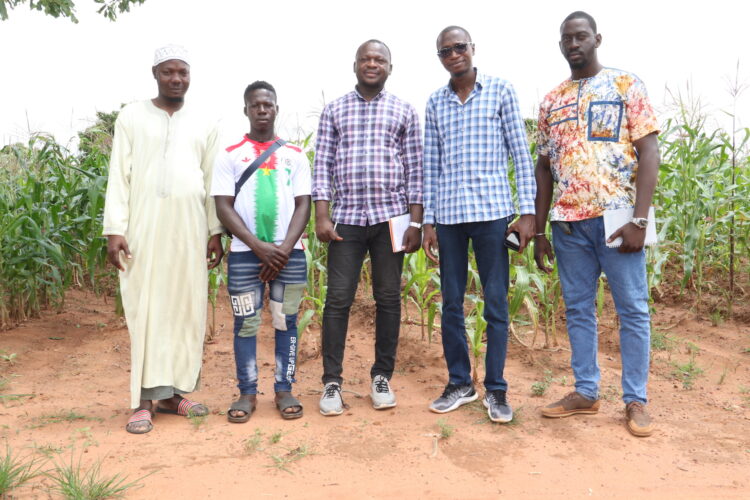
Having long been plagued by instability, conflict, and war, the people of the Great Lakes region remain steadfast in their pursuit of peace. With this objective in mind, young people from Rwanda, Uganda, the Democratic Republic of Congo (DRC) and Burundi met for three days in Kigali from 11 to 13 December for a workshop organised by Interpeace and its local partners, namely Pole Institute and Action pour la Paix et la Concorde (APC) in the Democratic Republic of Congo, Centre d'Alerte et de Prévention des Conflits (CENAP) in Burundi, Vision Jeunesse Nouvelle (VJN) and Never Again Rwanda in Rwanda. This workshop was part of the ‘Cross-border Dialogue and Youth Empowerment for Peace in the Great Lakes Region’ programme. The aim was to exchange ideas on peace initiatives led by young innovators and peace fellows supported by the programme.
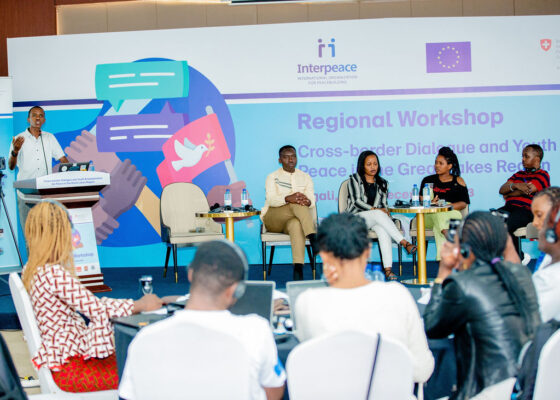
The workshop served as a platform to discuss peacebuilding efforts in the region and to pay tribute to the contributions of young people to build peace through their various initiatives in their respective countries.
In the DRC, young people have established the MUUNGANO spaces and the TUUNGANE KWA AMANI initiatives in the provinces of North and South Kivu, respectively, within schools, universities, and communities.
To promote peaceful cohabitation between refugees and the host communities in Uganda, young innovators use football to stimulate and facilitate socialisation and exchange between these two groups.
The J'IBUNTU initiative, launched by young people in Burundi, aims to promote socio-economic resilience in their communities. These young people are leveraging new information and communication technologies and setting up discussion platforms on social networks to reach a larger audience.
In Rwanda, young innovators are campaigning for mental health and entrepreneurship for peace through the AMANI YOUTH EXPO initiative. Their main target focus is training, informing, and raising awareness of these issues among young people.
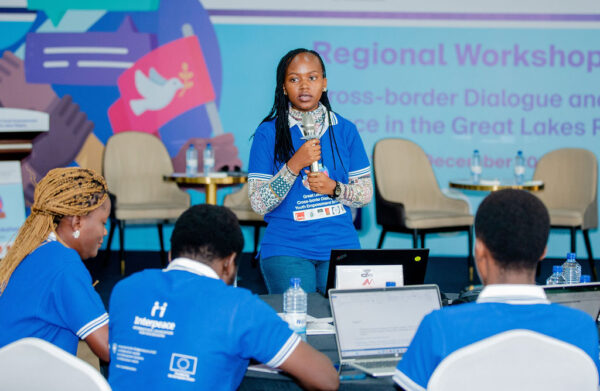
Convinced that peace is possible and to sustain the impact of their initiatives in the Great Lakes region, these young innovators are calling on everyone to take up the message of peacebuilding. They insist, however, on the support and active commitment of decision-makers to achieve lasting peace in the region, using their slogan: "So come around the fire, around the fire of peace.”
Representing the European Union at the workshop, Uwe Wissenbach, head of the political section of the delegation to Rwanda, recalled the coalition's efforts in peacebuilding and commended youth-led peacebuilding initiatives. "Resolving conflicts takes time and a lot of energy. The important thing is to get peaceful exchanges of ideas going so that we can build a future together. So, I listened very carefully to the various contributions of young people from different countries. Their initiatives are commendable," said Wissenbach.
Dominique Habimana, representative of the Swiss Development Cooperation at the workshop, emphasised, "Young people are the hope not only of tomorrow but also of today. Tomorrow starts today. They have the energy to rise to the challenges. Our role must be to support them so that they can play their part effectively."
Paul Rukesha, Director General for Communication and Partnerships at the Rwandan Ministry of National Unity and Civic Engagement (MINUBUMWE) was the guest of honour at the conference and called on young people to work together to combat hate speech. "We encourage young people to unite, to have love and to avoid all forms of discrimination," he said.
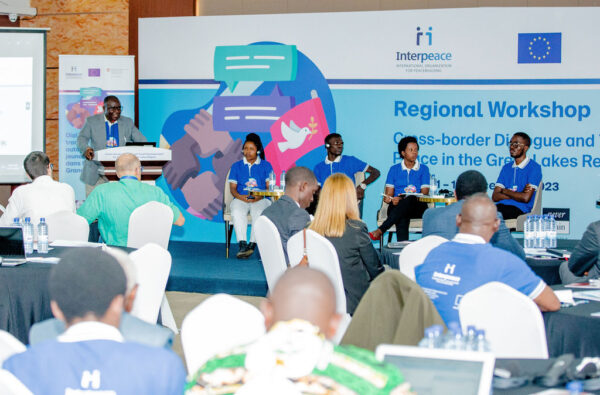
Since its launch, the ‘Cross-border Dialogue and Youth Empowerment for Peace in the Great Lakes Region’ programme, with financial support from the European Union and the Swiss Development Cooperation, has brought remarkable changes.
Its main achievements include 30 young innovators and 120 peace fellows trained and mentored to become actors for peace in their respective countries and communities; five innovative peace-building initiatives developed by young people, technically and financially supported by the programme; 19 intergenerational and intercultural dialogues and seven political dialogues organised, facilitating a safe space for young people and elders to discuss and promote a culture of dialogue to overcome prejudice and stereotypes; two cross-border peace festivals in Burundi and Rwanda, reaching 821 participants; and a Great Lakes Youth Peace Summit held in Burundi in March 2023, which provided a space for young people to exchange views with each other, with elders and with policy-makers on the challenges facing the new generation, as well as the opportunities to fully play their crucial role in the peace and development process.
